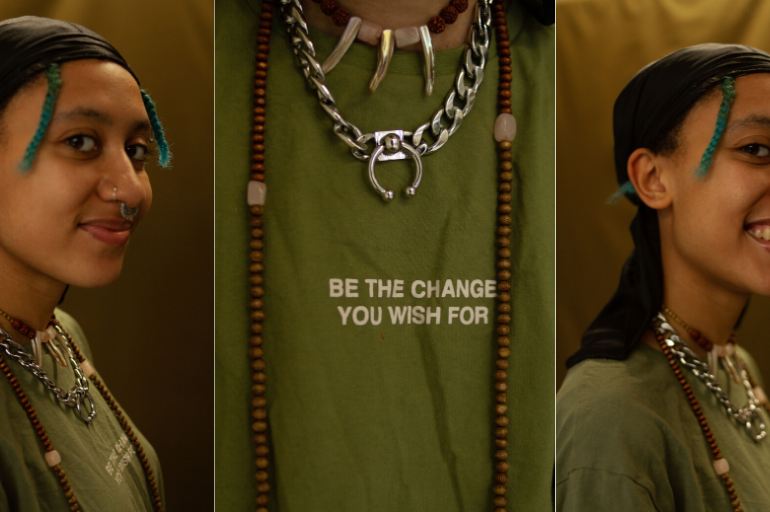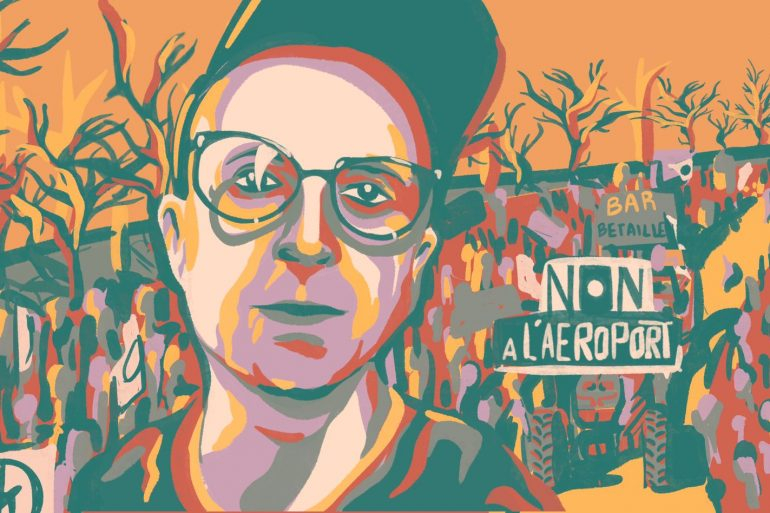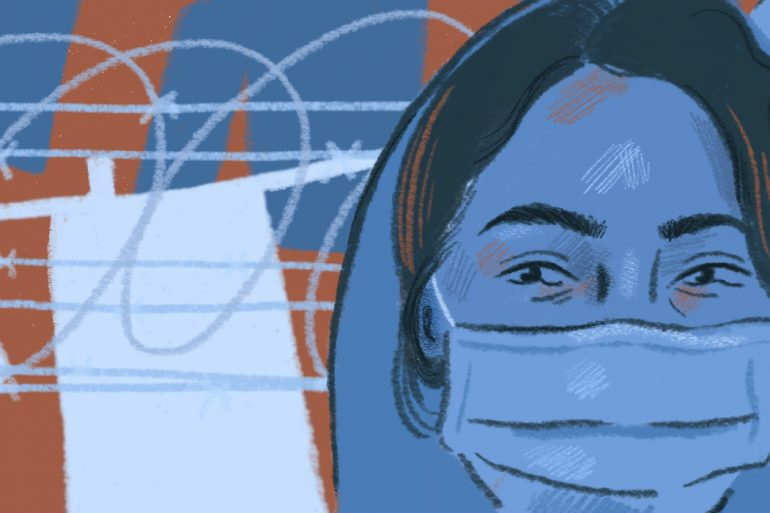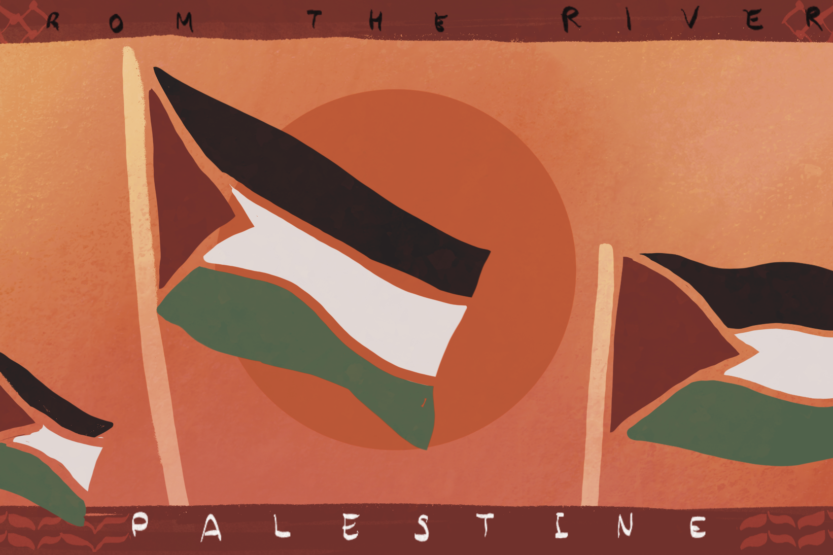We have a lot to thank Margaret Crane for. Despite battling huge push backs, she fought valiantly to make at-home pregnancy tests widely accessible. However, when I was taking one for the first time 13 years ago, gratitude towards the test’s designer was not my primary feeling.
I was living in Poland at the time, the place where I was born and grew up. I was sitting on the bathroom floor, terrified, waiting for the result to show up in the test window.
Growing up in a place with little access to adequate sex education, especially in regards to terminating an unwanted pregnancy left me with a deeply internalised belief that two lines on a test could only mean one thing: that I was pregnant and that there was no way out.
I felt ashamed; as if I had done something wrong; at risk of being trapped for a lifetime; and utterly alone. A few long minutes went by and a huge sigh of relief left my body when only one line appeared.
Several months later I was living in London, where I was exposed to different, more open attitudes towards abortion. I felt safe in the knowledge that, despite the UK’s abortion legislation being far from ideal, I had access to termination should I ever need one. It made sex a lot more fun.
Everyone deserves a right to bodily autonomy
When protests erupted in Poland in 2016 in response to the proposal of a near-total ban on abortion, I knew I needed to take action. I joined a newly formed collective: Dziewuchy London and, as part of a movement that swept the streets of Poland and beyond. As we protested outside the Polish embassy in London, we were joined by multiple feminist and grassroots groups from Poland, Ireland, Northern Ireland and Latin America.
The protest space became a platform for sharing our own abortion stories and allowed us to break away from the shame and stigma rooted in the patriarchal norms that exist to control female and non-heteronormative sexuality.
It became a space for learning about how politically charged abortion is worldwide, and why the far-right always attacks reproductive rights: to jeopardise everything that abortions make possible to women and gender non-conforming people. It became a space of solidarity and mutual support; a space that has formed lasting friendships.
What does ‘access to abortion’ really mean?
Since then, a lot of legislative changes have been made, in many places, both for better and worse. We won the battle and stopped the near-total ban in Poland in 2016, but abortion remains generally banned, and further legal restrictions were imposed in 2020.
Wins have also been seen in Ireland, Argentina and Northern Ireland where a legal right to termination has been achieved. The overturning of Roe v. Wade in the US in 2022 has also sparked other countries to address their own draconian legislation: Finland has relaxed its outdated law; Puerto Rico has fought off four anti-abortion pieces of legislation and France has secured the right to abortion in the constitution.
Every legal victory comes hard won and deserves a celebration. But there is a danger in an overly legalistic assumption that believes that removing legal barriers automatically means access to free, safe and local abortions for everyone.
To avoid falling into this trap, many movements and abortion providers across the world have adopted a holistic, radical approach when it comes to fighting for reproductive freedom.
Whilst there are no universal quick fixes that work in every context, it is important to stay familiar with each others’ strategies and show up in solidarity.
Having spoken to a number of abortion rights organisers and providers around the world, I’m here to reflect on key lessons which can help us in our struggles as we progress into 2023.
We are never done with this work, but we must make the work work for us.
Lesson 1: Recognise the importance of abortion pills
Abortion pills – Mifepristone and Misoprostol – are on the WHO Model List of Essential Medicines and, based on their 2022 recommendations, are safe to take at home without a gynaecological examination beforehand. According to the American Association of Reproductive Health Professionals, Mifepristone is safer to use than Aspirin and Viagra, and safer than carrying a pregnancy to term.
Yet in many countries, deliberate political decisions are made to restrict access to abortion pills. The recent FDA rule to make Mifepristone available in the US pharmacies unfortunately does not lift numerous restrictions to make the pills truly over the counter.
Where barriers are in place, grassroots networks of abortion providers are crucial to alleviating harm inflicted by anti-abortion policy makers and knowledge sharing is always vital.
Margarita Rebolledo Hernández is a Chilean, UK-based reproductive rights activist and artist. We first met at one of the protests at the Polish Embassy in London, and at the Festival of Choice that she co-organised. She told me as we caught up: “Knowledge sharing has been crucial, especially in territories where legislation is still very restrictive or ambiguous, but there may be access to things like Misoprostol, so knowing how you use that and how to look after each other can be incredibly powerful.”
Lesson 2: De-medicalise conversations around abortion and root your advocacy in lived experience
Socorristas en Red started in Argentina in 2012 as part of the The National Campaign for the Right to Legal, Safe and Free Abortion, and quickly grew into a nationwide network of helpers, providing over-the-phone support to anyone seeking to terminate a pregnancy.
Subscribe to shado's weekly newsletter
Exclusive event news, job and creative opportunities, first access to tickets and – just in case you missed them – our picks of the week, from inside shado and out.

At the heart of their organising has been non-judgemental guidance and de-medicalisation of abortion in order to, much like Margaret Crane did with pregnancy tests, place abortion pills directly in the hands of those who need them.
Amplifying how commonplace the experience of abortion is became a part of the successful legal battle. And between January and November 2020 alone, Socorristas were able to assist 13,408 people in their decision to terminate a pregnancy.
Activists from the Polish Aborcyjny Dream Team (ADT) have never hidden how much the work of the Socorristas in inspired their approach. “In Poland, we needed to focus first and foremost on self-help and access to abortion, so that people living here could safely terminate their pregnancies despite restrictive laws,” says Natalia Broniarczyk from ADT. “In our opinion, the best way to fight for legal abortion is to do abortions and to show it as our experience. In this way we prove that the law is one thing, and our reality is another, and that no law, not even the strictest abortion law, can force anyone to give birth.”
In 2018, ADT revitalised the Polish pro-choice movement with the Wysokie Obcasy magazine cover wearing T-shirts that read Abortion is OK.
They also make Instagram reels and TikToks to show that we are having abortions while we watch our favourite films at home, taking an exam at school, going to work, while we garden or iron clothes – the way the hips move while ironing actually helps the womb with emptying itself.
Their success has been in using the space of reproductive rights protests in Poland to disseminate the abortion helpline number and run tutorials on how to dose Mifepristone and Misoprostol. Natalia’s historic speech in the Polish Parliament as part of the Legal Abortion Without Compromise civic bill initiative included a demonstration of abortion pills too.
ADT is part of the Abortion Without Borders network that helps 99 people to access abortion pills and 7 people to travel for a procedure abroad every day. They show up for other activists facing state repressions and amplify the often marginalised voices in the abortion discourse.
Lesson 4: Build cross-movement solidarity
Alliance for Choice (A4C) has campaigned for abortion access, sex education for young people, and an end to harassment of people accessing reproductive health services in Ireland and Northern Ireland since 1996.
They organise talks with an abortion doula and run regular abortion pill workshops with Doctors for Choice. They also set up a working group, Whispered Conversation, dedicated to abortion and disability rights to create a space where people with disabilities can discuss their experience, and to tackle the assumption that having a disability somehow means that one is anti-abortion.
“As a woman with a disability, I have always known that a lot of people with disabilities are fed up with the politicians’ paternalistic discourse in regards to what is, supposedly, good for us,” Naomi Connor, Co-Convenor at A4C tells me over Zoom.
“It is the very same politicians attacking abortion rights and masquerading as our allies, who also tend to vote for cuts to welfare that hit people with disabilities the hardest. It was never about care, it was about coercion,” says Naomi, showing that the fight for bodily autonomy spans across all fights for equality – and that strength lies in coalition.
The fight for decriminalisation and legalising abortion in Northern Ireland ended in success in October 2019, (though the actual provision of services was only commissioned by the Northern Ireland Office in October 2022). In this, cross-sector solidarity and coalition-building was key. A4C joined forces with multiple trade unions to form a steering group for the ‘Abortion as a workplace issue’ research. “It was the first survey of its type worldwide – asking 3,180 union members on the effects of abortion in the workplace. It was conducted prior to the referendum in Ireland to give informative analysis of abortion in the workplace, how abortion affects workers, and the socio-economic context,” states Mandy La Combre from Trade Unions for Repeal the 8th.
The survey showed that 42% of those who had a direct experience of abortion as a workplace issue struggled to pay the cost, 28% needed time off for an abortion and used annual leave, and 73% did not disclose their abortion to anyone at work. In addition to the survey, a discussion forum was held. One of its key findings underlined that many union members did not think about abortion as a workplace issue until taking part in the study. Participants shared how listening to first-hand accounts provoked them to reflect on their own attitudes towards abortion. It sheds some light on why anti-abortion movements thrive on abortion taboo and erase real life experiences from their rhetoric, making it more difficult for separate causes to find common ground.
Lesson 5: Persevere in protest!
Abortion became legal in Argentina in 2021, whilst The National Campaign for the Right to Legal, Safe and Free Abortion started in 2005.
It took activists in Argentina many attempts to change the law, taking to the streets each time and laying organisational groundwork in between times of big mobilisation. They never limited themselves to a single issue, but combined them. The movement against the machista violence became The Green Tide (Marea Verde) linking the fight against femicides with the fight for the right to abortion.
“I believe that since #NiUnaMenos (Not A Single Woman Less) movement became stronger, and the fight against gender-based violence gained support in the country, the initiative of a pro-choice movement was a matter of time,” says Cecilia Delfini, who was part of Mujeres Autoconvocadas in Punta Alta, Argentina and assisted the Socorristas.
“The main obstacle in our country was religion, particularly Catholicism. When in 2018, the Senate rejected a bill legalising abortion, the conversation shifted to public health and became of interest to the public and politicians. It was a victory on the streets. With every march, the clandestinity of abortions and deaths as a consequence of unsafe abortions was exposed, making the whole country aware of the urgent need for change.”
Lesson 6: Continue the fight for the right to access for ALL communities after legislation has been won
Although the fight to retain pandemic induced access to at-home abortions in England and Wales has been won, it is not a right granted to all. In particular a lack of access is still being faced by asylum seeking communities. Immigration status determines access to free healthcare in the UK which has left many people facing extortionate fees for abortions whilst simultaneously being denied the rights to work and receive benefits under the hostile environment immigration policies.
Ewa Pospieszyńska, a Polish, UK-based organiser with Razem and Strajk Kobiet, highlights that The Abortion Act still criminalises abortions in the UK, and warns against the assumption that it cannot be reenacted. “Anti-abortion organisations in the UK are being fuelled by the ultra-conservative movements that already work internationally,” Ewa says. “The only way to oppose them is by joining our efforts beyond borders, staying in solidarity, and being unapologetic about our demands.”
Lesson 7: The importance of radical rest in the reproductive rights movement
I have always refused to feel guilty for taking breaks in organising. Resting, rejuvenating, reflecting and reassessing are key so we can take care of ourselves and keep going in ways that are both sustainable and strategic.
For me, there was a particularly challenging moment in the Polish reproductive rights movement at the end of 2020 when protests erupted again in Poland and beyond, but in the UK both the pandemic and the Police, Crime, Sentencing and Courts Act (in its initial stages at the time) placed severe limitations on the rights to protest. I needed a moment of real pause before I reached out to the Dziewuchy London Facebook group with an idea to project protests’ imagery and messaging onto London landmarks. That’s how the Tell Someone About Poland action happened. It was important to us that our messages are seen by the British public, and that our solidarity reaches protesters in Poland.
I spoke with Olivia from the Feminist Assembly of Latin American diaspora in the UK (FALA) who agrees that creating space for rest is crucial to the longevity of movements. She created Narrativas Colectivas, a space for vulnerability, where those who have chosen to have an abortion to come together and share. “I believe we need to also build spaces which allow us to rest together, as abortion can be such an isolating experience. We need spaces to reflect on our own experiences and go beyond them, breaking the individualistic approach that the capitalist regime imposes on us.”
Hope for the future
Having spoken to all of these organisers from different countries, I am left feeling energised after being reminded of just how much has already been achieved. The far-right keeps on attacking reproductive rights, yet the pro-abortion movements make tangible progress despite it all. It is inspiring to see the movements fighting fearlessly in solidarity for all who need abortions and incredibly refreshing to see abortion finally being discussed for what it is – a common medical procedure.
These global groups are loud and proud. They don’t wait for permission from anyone. The know-how on accessing and using Mife and Miso which now exists in Poland is something I would have wished for my younger self – safe in the knowledge that sex can be explored joyfully and that two lines on a test are not the final verdict.
What can you do?
There are multiple actions you can take towards advancing reproductive justice.
- In England and Wales, ending one’s own pregnancy with the tablets obtained outside of the formal healthcare system is a crime, and it carries a maximum life sentence under the 1861 Offences Against the Person Act. Current laws hurt the most vulnerable who cannot access the NHS services. Two people faced criminal trials last year for taking Misoprostol on their own. Email the Secretary of State for Justice and urge them to update the law. You can use the template from the British Pregnancy Advisory Centre here.
- In Poland it is not a crime to end one’s own pregnancy, but it is criminalised to help someone else with accessing an abortion. Justyna Wydrzyńska, an abortion activist from Aborcyjny Dream Team is facing 3 years in prison for giving abortion tablets to ‘Ania’ who had an abusive partner. Demand the charges against Justyna to be dropped by adding your signature to Amnesty International’s petition here. Don’t forget to shout your support on socials with the hashtag #JakJustyna #IAmJustyna.
- Fund an abortion if you can. Donate to one (or several) of the following organisations: Abortion Support Network helps people in Ireland, Northern Ireland, the Isle of Man, Malta, Gibraltar, Poland, Romania, Hungary, France, Spain, the Czech Republic and the other EU countries. Aborcyjny Dream Team and Abortion Without Borders help those residing in Poland. Women Help Women support people with self-managed abortions in 17 countries across 4 continents. Women on Web are a Canadian organisation working internationally in nearly 200 countries.
- Stay connected. Follow the organisations mentioned in this article on social media. Here are some handles for you: Socorristas en Red, Aborcyjny Dream Team, Shout Your Abortion, MAMA Network, Alliance for Choice, Abortion Support Network.
- Educate yourself! Women Help Women gathered a number of resources on self-managed abortion in English, Spanish and Portuguese. Katha Pollit talks about destigmatising abortion in her book PRO: Reclaiming Abortion Rights, and you can listen to her talk about the book here. If you would like to hear abortion coming outs, You’re Wrong About podcast dedicated an entire episode to them. For Polish speakers, Legalna Aborcja hosted a series of live discussions on the 7th of January, the 30th anniversary of the infamous 1993 abortion ban, to summarise where are we at with the Polish pro-abortion movement.
- Fight abortion stigma! None of us is free from it, but we are all capable of dismantling it. If you’re in Dublin on the 4th of February, you could attend a free workshop on abortion stigma from Alliance for Choice (alternatively, check out their pro-abo merch!). You can read abortion stories and share your own with Shout Your Abortion. If you are considering writing about abortion to press – check out the media pack from MAMA Network for guidance on how to talk about abortion without stigma. Finally, never underestimate the power of a one-to-one conversation. Making yourself known as a non-judgmental person to talk to about abortion is a revolutionary act.
- Read about draconian abortion laws in Malta HERE
- Read about the fight for abortion rights in Poland HERE















